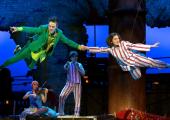As its title foretells, Moonlight is a luminous film. It shines light on experiences that may be completely different from our own, drawing us in with utter empathy. Director Barry Jenkins shows his lead character finding his way out of darkness, through pain, to attain a tentative revelation of self-acceptance. Yet this is no direct or glaring light: Jenkins shows himself a master of nuance, working with a script that is light on words but speaks unforgettably in the primal language of cinema itself.
It’s an independent film in the essence of that term, something that makes its progression to the front ranks of this year’s Academy Awards all the more impressive. And how skilfully Moonlight confounds definition by the categories into which it might easily be slotted – as a gay film, or a black film, however much both elements are crucial to its identity.
What’s more important is that Chiron is somehow learning to trust
To achieve something so universal, Jenkins has set his drama in a very particular location, the Liberty City district of Miami. It was where the director himself grew up, as did Tarell Alvin McCraney, the writer from whose original drama treatment In Moonlight Black Boys Look Blue the film is adapted. The two did not know each other then: what they did share in youth, however, was the experience of growing up with mothers who had drug addiction issues.
It’s there that we first encounter the film’s hero, 10-year-old Chiron (Alex Hibbert, slight, silent), who’s known as “Little”, the word that gives the first of Moonlight’s three sections its title. The second, which carries the boy’s given name, catches him at 16, now played by Ashton Sanders, gangly and avoiding eye contact. The third, with Chiron a young adult, is titled “Black”, after the moniker he’s now given himself (also an affectionately bestowed nickname he had acquired in the middle episode).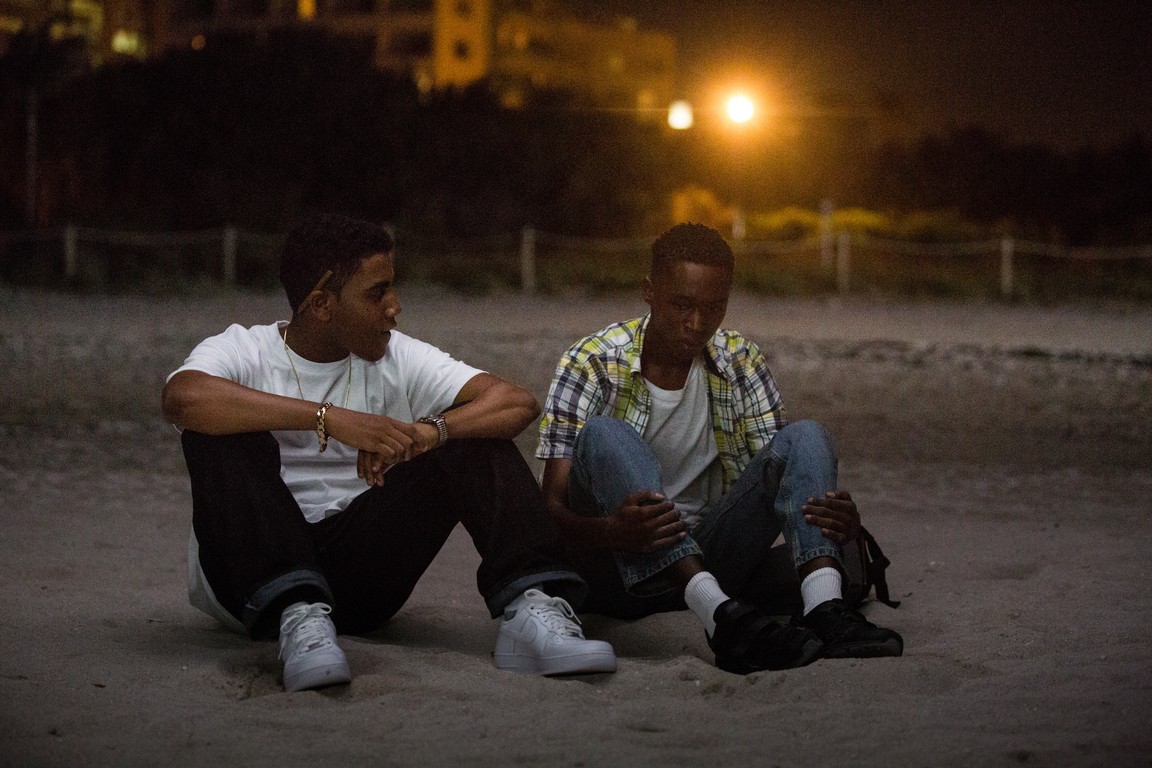 It’s not only physical slightness that sets Chiron apart: he’s treated as an outsider by his more aggressive contemporaries for another reason, one which they sense but he himself has not yet registered. The film opens with the latest of what we guess is a series of rejections, but this one ends on a more positive note with Little befriended by Juan (Mahershala Ali). Of Cuban descent, Juan may be a community hard man and drug dealer, but he shows only kindness to this resolutely silent youngster, first feeding him and then taking him home to his girlfriend Teresa (Janelle Monáe).
It’s not only physical slightness that sets Chiron apart: he’s treated as an outsider by his more aggressive contemporaries for another reason, one which they sense but he himself has not yet registered. The film opens with the latest of what we guess is a series of rejections, but this one ends on a more positive note with Little befriended by Juan (Mahershala Ali). Of Cuban descent, Juan may be a community hard man and drug dealer, but he shows only kindness to this resolutely silent youngster, first feeding him and then taking him home to his girlfriend Teresa (Janelle Monáe).
Her home becomes a place of refuge for the troubled Chiron as the circumstances of his home life with mother Paula (Naomie Harris, falling gradually and hauntingly into full crack addiction), as well as that of this “adopted” family change. The other anchor point of Chiron’s world is his friendship with his contemporary Kevin, shown from innocent childhood games through to more loaded adolescent encounters, a bond that will also presage damage as the film progresses.
“At some point you've got to decide who you wanna be. Can’t let nobody make that decision for you,” Juan tells the boy at one point, his phrase catching the essence of what Moonlight is about: the shaping, the realisation of the eventual adult character. Juan’s words come shortly after one of the film’s tenderest moments, as he teaches the child to swim, though what’s actually more important is that Chiron is somehow learning to trust. The tragic irony that Ali’s character, the one who shows such concern for Chiron, is also dealing the substances that are bringing his mother down, prompts one of the most poignant moments of the first episode.
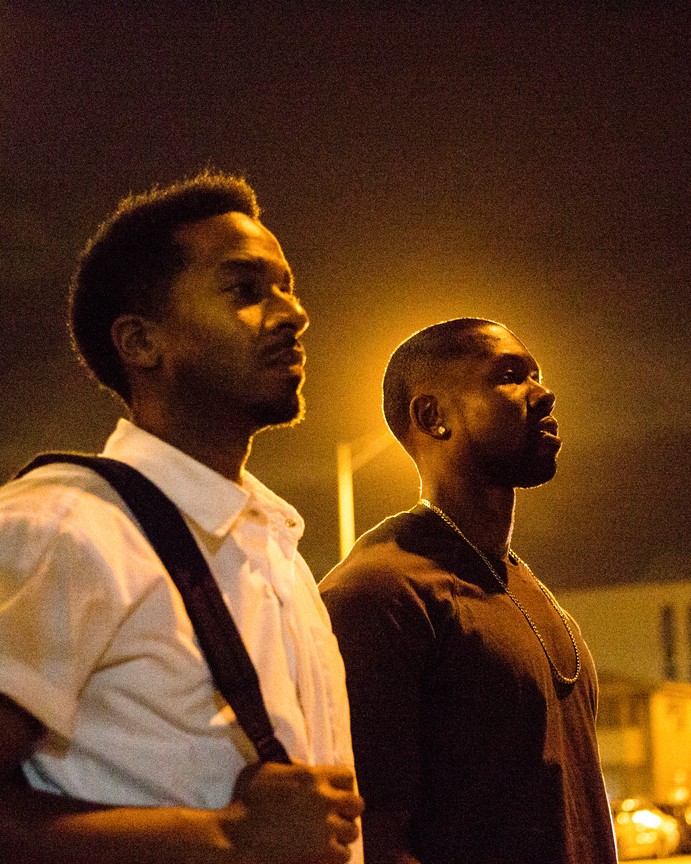 The defining moment of the succeeding section also takes place at the sea, as Chiron and Kevin talk on the beach (pictured above, Jharrel Jerome, left, with Ashton Sanders): Chiron once more risks trust, relaxing the barriers of self-protection that he has constructed around himself (“I cry so much sometimes I might turn to drops”, he poignantly reveals). The cruelty is that hurt will again follow revelation, culminating in an act of self-assertion that will change the course of the young man’s life, sending him away from his home environment.
The defining moment of the succeeding section also takes place at the sea, as Chiron and Kevin talk on the beach (pictured above, Jharrel Jerome, left, with Ashton Sanders): Chiron once more risks trust, relaxing the barriers of self-protection that he has constructed around himself (“I cry so much sometimes I might turn to drops”, he poignantly reveals). The cruelty is that hurt will again follow revelation, culminating in an act of self-assertion that will change the course of the young man’s life, sending him away from his home environment.
But distance is not the only change that comes with Moonlight’s final part. Trevante Rhodes (an erstwhile professional sportsman himself, physically powerful here, yet so damaged inside) plays the now adult Black, who’s bulked himself up protectively: he’s become a dealer, like his first mentor Juan, with a muscled body to match, teeth ribbed in gold. When Black makes an almost impromptu journey from his new home territory, Atlanta, back to Miami, his whole life comes up for reappraisal. (Pictured above: André Holland, left, with Trevante Rhodes.)
Jenkins’ choice of an elliptical narrative structure, one that registers change rather than spelling it out, is a stroke of genius. It also makes for the sheer freshness of impression that is so powerful in Moonlight, suitable not only for a story anchored in childhood, but also involving a hero who’s at times reticent almost to the point of speechlessness. It's as if the director defines his canvas through spots of colour that coalesce into an image, rather than through any direct stroke of the brush.
Moonlight’s visual sense is highly painterly, too, from the pastel tones of the Liberty City locations (James Laxton’s cinematography catches them with an easy beauty that surely belies their real character) through to the distinct colour orientations of the film’s three parts. There’s a sheer confidence in Nicholas Britell’s score too, melding what we might expect – rap, jukebox melodies – with the grand emotional assertions of Mozart. Comparisons already drawn with the likes of Terrence Malick are not incidental, such is Jenkins’s sheer flair: it's only his second feature, and to draw this quality of performance from his three male leads and supporting players alike is an almost impeccable achievement. Revelatory filmmaking.
Overleaf: watch the trailer for Moonlight



 It’s not only physical slightness that sets Chiron apart: he’s treated as an outsider by his more aggressive contemporaries for another reason, one which they sense but he himself has not yet registered. The film opens with the latest of what we guess is a series of rejections, but this one ends on a more positive note with Little befriended by Juan (Mahershala Ali). Of Cuban descent, Juan may be a community hard man and drug dealer, but he shows only kindness to this resolutely silent youngster, first feeding him and then taking him home to his girlfriend Teresa (Janelle Monáe).
It’s not only physical slightness that sets Chiron apart: he’s treated as an outsider by his more aggressive contemporaries for another reason, one which they sense but he himself has not yet registered. The film opens with the latest of what we guess is a series of rejections, but this one ends on a more positive note with Little befriended by Juan (Mahershala Ali). Of Cuban descent, Juan may be a community hard man and drug dealer, but he shows only kindness to this resolutely silent youngster, first feeding him and then taking him home to his girlfriend Teresa (Janelle Monáe). The defining moment of the succeeding section also takes place at the sea, as Chiron and Kevin talk on the beach (pictured above, Jharrel Jerome, left, with Ashton Sanders): Chiron once more risks trust, relaxing the barriers of self-protection that he has constructed around himself (“I cry so much sometimes I might turn to drops”, he poignantly reveals). The cruelty is that hurt will again follow revelation, culminating in an act of self-assertion that will change the course of the young man’s life, sending him away from his home environment.
The defining moment of the succeeding section also takes place at the sea, as Chiron and Kevin talk on the beach (pictured above, Jharrel Jerome, left, with Ashton Sanders): Chiron once more risks trust, relaxing the barriers of self-protection that he has constructed around himself (“I cry so much sometimes I might turn to drops”, he poignantly reveals). The cruelty is that hurt will again follow revelation, culminating in an act of self-assertion that will change the course of the young man’s life, sending him away from his home environment.



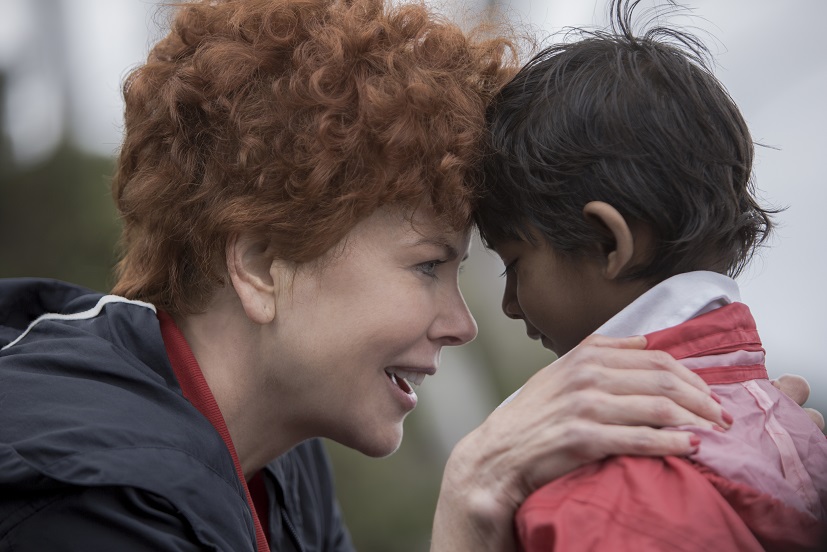 When all attempts to resolve the mystery of where he has come from fail, Saroo is chosen for international adoption, and his next removal is to Tasmania, to his new parents Sue and John Brierley (Nicole Kidman, David Wenham). After the aridity and tumult of India, this Australian landscape is an open one, dominated by water, every bit as unfamiliar to Saroo as the refrigerator and television in his new home. Pawar conveys a wide-eyed, silent wonder as he discovers it all, and he’s anchored by Sue's unquestioning presence. There’s nothing glamorous about Kidman (pictured above with Pawar) – even for late-80s Tasmania she seems almost determinedly plain – but she’s translucently sure of herself, emanating a stillness that captures the screen. It’s an assurance that will be tested with the arrival of the couple’s second adopted son, Mantosh, clearly damaged by his experience in a way that Saroo has avoided.
When all attempts to resolve the mystery of where he has come from fail, Saroo is chosen for international adoption, and his next removal is to Tasmania, to his new parents Sue and John Brierley (Nicole Kidman, David Wenham). After the aridity and tumult of India, this Australian landscape is an open one, dominated by water, every bit as unfamiliar to Saroo as the refrigerator and television in his new home. Pawar conveys a wide-eyed, silent wonder as he discovers it all, and he’s anchored by Sue's unquestioning presence. There’s nothing glamorous about Kidman (pictured above with Pawar) – even for late-80s Tasmania she seems almost determinedly plain – but she’s translucently sure of herself, emanating a stillness that captures the screen. It’s an assurance that will be tested with the arrival of the couple’s second adopted son, Mantosh, clearly damaged by his experience in a way that Saroo has avoided. But it’s something else that he learns from them that propels Lion’s denouement. When Saroo opens up about his past, their mention of Google Earth sets him on a new journey, which will both disrupt his Australian life and (no particular spoiler alert) open a new Indian world. That it’s a piece of new technology that sets him out on his journey home may seem at first anomalous – myths normally being made of things other than GPS coordinates and screen images – but there’s no disputing the reality of Saroo’s story: we see its real-life conclusion in the film’s coda.
But it’s something else that he learns from them that propels Lion’s denouement. When Saroo opens up about his past, their mention of Google Earth sets him on a new journey, which will both disrupt his Australian life and (no particular spoiler alert) open a new Indian world. That it’s a piece of new technology that sets him out on his journey home may seem at first anomalous – myths normally being made of things other than GPS coordinates and screen images – but there’s no disputing the reality of Saroo’s story: we see its real-life conclusion in the film’s coda.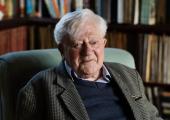

 Bach: Christmas Oratorio Dunedin Consort/John Butt (Linn)
Bach: Christmas Oratorio Dunedin Consort/John Butt (Linn)
